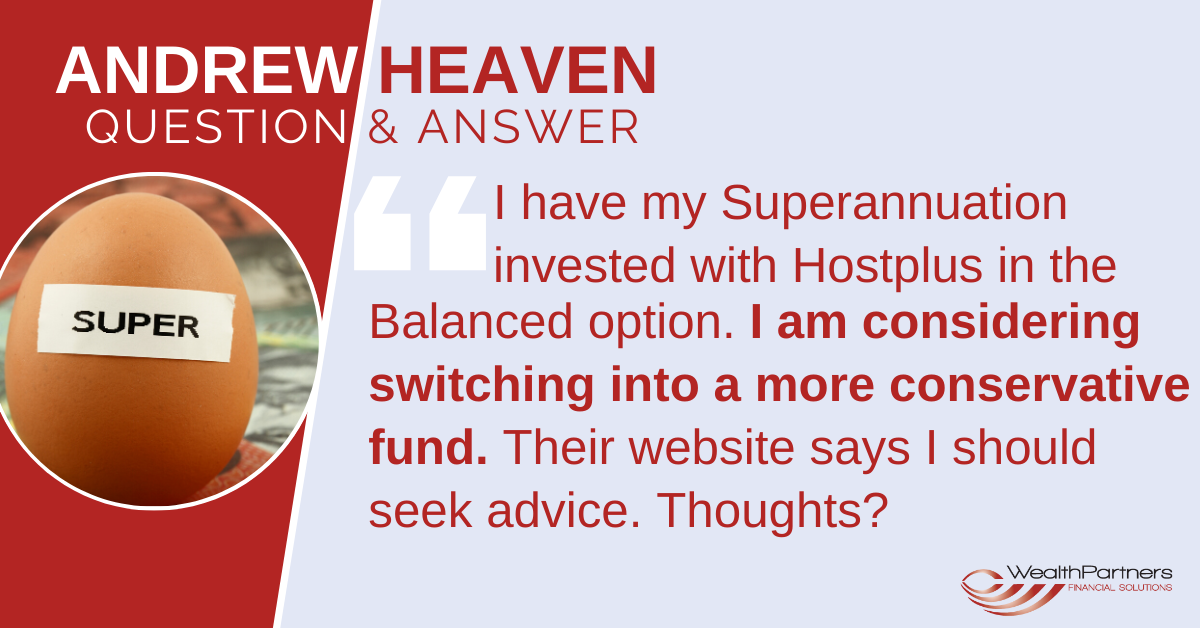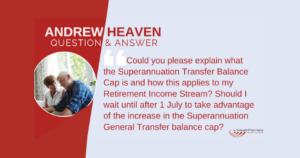
Q: I have my Superannuation invested with Hostplus in the Balanced option. I am considering switching into a more conservative fund. Their website says I should seek advice. Thoughts?
A: In the current investment environment, it is critical to review your investment strategy to ensure your portfolio is best positioned to meet your needs.
Volatility festers uncertainty so here are a few primary considerations you should be aware of before making any changes.
Review your investment time frame. If you are in your 40’s and you are investing for retirement, then you are in a far better position to allow your funds to recover in value through the investment cycle compared to someone who is planning to retire in 5 years time. Ensure your investment asset allocation reflects your investment time frame. The shorter the time frame for investing the more conservative your investments should be.
Ensure you are comfortable with the amount of risk you are taking with your investments. If you are worried about the volatility in your portfolio, you should review your appetite for risk. Complete a risk profiling questionnaire to determine what level of risk you are comfortable with.
Having considered your investment time frame and investment risk profile, ensure your super funds are invested in line with your needs around time frame and risk profile.
Given the current investment climate, it is critical that super funds fully inform their members about how their funds are invested, how these assets are valued and how liquid these investments are. Past performance is not a primary consideration in the context of the current market. I have grave concerns in relation to the current behaviour of Hostplus and other super funds that have a large exposure to unlisted assets.
A Superannuation fund trustee is obliged to report to its members on the performance and valuation of their members’ superfunds. Most report the unit price valuation on a daily basis.
When a Super fund invests in assets that are traded in a market on a daily basis, this is relatively simple albeit confronting in times of extreme volatility such as we face now.
This becomes more challenging when a super fund invests in assets that are not listed in a market or priced on a day-to-day basis. It is perfectly reasonable for a super fund to invest in unlisted assets such as direct property, infrastructure and private equity investments. However as a super fund member, it is vitally important that you understand what exposure you have to illiquid or unlisted assets and that the trustee reports the valuation of these assets on an accurate basis.
You face two major risks; the valuation of the unlisted asset reflects the true value of the asset. To date a number of the larger industry funds that have an allocation to unlisted property and infrastructure have written down the value of these assets by between 7 and 10%. I seriously challenge whether this is a true reflection of the current value of these assets when similar listed assets have fall in value by 30%.
Whilst the super fund may state that these valuations may reflect a “smoothing” of returns over the medium term, my issue is that they do not reflect the current valuation of these assets. Why should a member be able to switch out with the benefit of an inflated value on unlisted assets to the detriment of those members remaining within the fund?
The other major concern is liquidity. In the event that a super fund faces a large number of redemptions or switches, the remaining members in the fund face substantive risks. If the fund elects to retain illiquid assets in an environment of negative fund flow, the unlisted assets may form a larger portion of the portfolio which may make the fund riskier. If the super fund is compelled to sell illiquid assets to meet redemption requests, they will be compelled to sell the asset at market value which may not reflect the value of the asset that has been reported to the members.
In these challenging times these two risks become profound. Especially a fund that has a high exposure to members seeking urgent access to their super. Understandably, super fund members may prioritise meeting immediate income needs over savings for retirement.
Be mindful of these risks and ensure that your fund will continue to allow you to switch between investment options, allow you access to your funds and for those who elect to stay in a particular investment option, that the reported value truly reflects the value of the assets of the fund.
If a fund was to freeze redemptions or switches, you may find yourself locked into investments that may not suit your needs or in a worst case unable to access your Super at the time you may need it most. If your super fund cannot satisfy your concerns, it may be time to move now.

